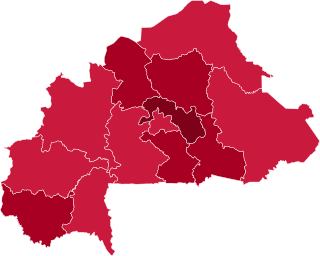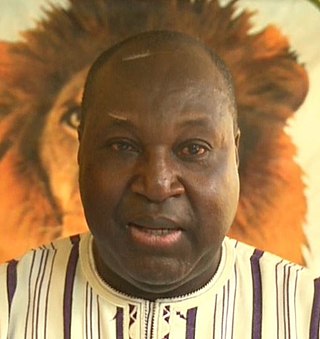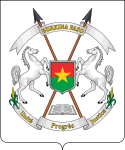
The Politics of Burkina Faso takes place in a framework of a semi-presidential republic, whereby the Prime Minister of Burkina Faso is the head of government, and of a multi-party system. The President of Burkina Faso is the head of state. Executive power is exercised by both the President and the Government. Legislative power is vested in both the government and parliament. The party system was dominated by the Congress for Democracy and Progress (CDP) until 2014. Burkina Faso's CDP fell victim to a series of demonstrations and riots, to alter the constitution and extend the former president's term in office - referred to as the 2014 Burkinabé uprising. The military then declared itself to be in power and the state shifted to an electoral autocracy. Burkina Faso lacks the foundation that would support a democracy, with its current transition to a military regime, but not all hope is lost. After an internal coup ousted Paul-Henri Sandaogo Damiba, the previous military head of state, a new transitional charter was adopted, naming Captain Ibrahim Traoré as president. Mr. Damiba's progressional failures on the state's security front “swung a majority of domestic opinion in favour of the MPSR”. Mr. Traoré pledged a major reinforcement of armed forces to strengthen frontline units and recruited over 3,000 more troops. As the violence becomes so entrenched, it is nonetheless expected that the security situation will remain dire in the medium term. “However, we expect that elections will still be held in 2024 as part of the army's plan to stabilise the security situation by boosting counter-terrorism operations.”

The Congress for Democracy and Progress was the ruling party in Burkina Faso from 1996 until the overthrow of Blaise Compaoré in 2014.

The Burkinabè Communist Group was a communist party in Burkina Faso. The GCB surged as a split from the Voltaic Revolutionary Communist Party in 1983, following the refusal of PCRV to support the revolutionary government of Thomas Sankara.

Presidential elections were held in Burkina Faso on 13 November 2005. Incumbent president Blaise Compaoré was re-elected with around 80% of the vote.

The Organization for Popular Democracy – Labour Movement was the ruling political party in Burkina Faso from 1989 to 1996. It was founded in April 1989 by the Union of Burkinabè Communists, the Revolutionary Military Organization (OMR) and factions from Communist Struggle Union - The Flame and Burkinabè Communist Group as a party based on Marxism, but strongly pragmatic, adopting the free market in its economic plan. It renounced Marxism–Leninism in March 1991.

Change 2005 was a political alliance in Burkina Faso, founded to contest the presidential election in 2005. The incumbent, Blaise Compaore, was standing for a third term and was expected to win despite claims that another term in office would be unconstitutional. He was re-elected with 80.35% of the votes.

The Dialogue of the Burkinabé Opposition was a political alliance in Burkina Faso (former Upper Volta. It was founded in January 2002 by the following political parties:

The Party of Labour of Burkina was a political party in Burkina Faso.
Articles related to Burkina Faso include:

Sankarism is a term sometimes applied to denote a left-wing ideological trend within the politics of Burkina Faso, a landlocked country in West Africa, as well as the policies of the military government led by Captain Thomas Sankara. Sankara came to power in what was then the Republic of Upper Volta in a popularly supported 1983 military coup, and ruled until his assassination in a coup led by Blaise Compaoré in 1987.
The Republican Front was a coalition of political parties in Burkina Faso. The coalition was launched on January 23, 2014, at a conference held at Hotel Splendid in the capital Ouagadougou. Some forty political parties took part in the foundation of the coalition. The coalition emerged in response to popular protests against reform of Article 37. The coalition supported holding a referendum on Article 37 of the Constitution, which would have enabled the president Blaise Compaoré took be re-elected. Amongst the leaders present at the founding of the Republican Front were Assimi Kouanda, Alain Zoubga, Ram Ouédraogo, Hermann Yaméogo, Maxime Kaboré, Toussaint Abel Coulibaly and Diemdoda Dicko (CFD).

The National Convention of Progressive Patriots–Social Democratic Party was a political party in Burkina Faso led by Pierre Tapsoba.

Zéphirin Diabré is a Burkinabé politician. He served in the Government of Burkina Faso as Minister of Finance from 1994 to 1996.

Soumane Touré was a Burkinabé politician and trade unionist. He was a prominent student activist during his youth and joined the communist African Independence Party (PAI). He served as the general secretary of the Burkinabé Trade Union Confederation (CSB) for many years and was a prominent leader of the Patriotic League for Development (LIPAD) mass movement. He was arrested on several occasions by different governments and even sentenced to death in 1987, only escaping execution through an intervention by then president Thomas Sankara. He was elected to the National Assembly in 2002 and ran for president in 2005.







